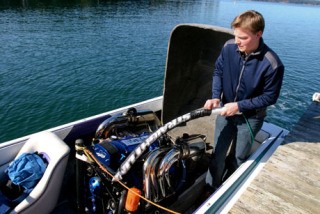The InTheWorks company ski boat idling alongside a dock in Manzanita Bay last week had all the trappings of a high-performance machine.
With its engine cover thrown back, the 500-plus horse-power Mercury racing engine rumbled steadily. Rows of mirror-polished exhausted headers gleamed.
More impressive is what was missing. Nowhere in sight was the heavy, eye-stinging haze that usually hovers around the stern of a gasoline-powered boat.
That’s because snugged onto the boat’s exhaust system is a custom-made catalytic converter, the invention of Bainbridge native Todd Hansen.
Hansen and InTheWorks, the Kitsap-based startup company he helped found in 2008, are touting the AquaCat as the first catalytic converter capable of eliminating 99 percent of emissions from high-performance marine engines without a loss of power.
“It’s revolutionary,” Hansen said. “It’s something that could be used industry-wide.”
InTheWorks is working on a licensing deal with an original equipment manufacturer in California to produce its AquaCat catalytic converter for use on gasoline-powered marine engines.
From its own testing, InTheWorks claims the AquaCat has trend-bending benefits both for the environment and users.
The company’s literature says the AquaCat is capable of burning off hydrocarbons, poisonous carbon monoxide and greenhouse gasses. At the same time, the company says the AquaCat has improved fuel economy on the company boat while deadening engine noise. And, most importantly for the power-sport industry, “There’s no loss in power,” InTheWorks co-founder and CEO Scott Reynvaan said. “That’s huge to the performance people.”
Hansen, who grew up tinkering with water ski boats on Manzanita and graduated from Bainbridge High School, conceived the AquaCat technology in an organic chemistry class at the University of Washington. He began pondering the challenge of cutting emissions from boat engines that could meet federal emissions and safety guidelines.
Culling concepts from several courses he was taking, Hansen designed a catalytic converter that utilizes a unique housing to burn off more emissions more efficiently than standard converters. Integration with the engine’s water cooling system keeps the converter’s shell at 85 degrees.
With the initial concept in hand, Hansen began work on prototypes of the AquaCat with David Endrigo, a designer and machinist who now serves as InTheWorks vice president.
Hansen and Endrigo, joined by Reynvaan, incorporated the company in January 2008. Bainbridge Graduate Institute MBA student Jamie Forsyth was brought on to help develop the business and will soon become the company’s first employee.
While developing the AquaCat, InTheWorks raised $500,000 in capital through private investors – mostly “family, friends and friends-of-friends,” Reynvaan said.
InTheWorks is already turning its attention to new fields. In the coming year the company plans to expand its AquaCat technology for use with diesel engines. Farther down the line it envisions its products being used for agricultural equipment, public transit and even factory smokestacks.
With government funds and initiatives springing up to support clean energy, Forsyth believes now is a good time to ride the green wave.
“It’s nice to be a clean-tech business in this economy,” Forsyth said. “Because that’s where the funding is.”


